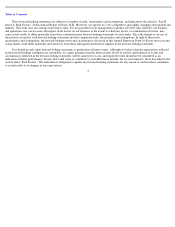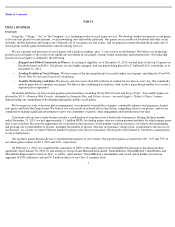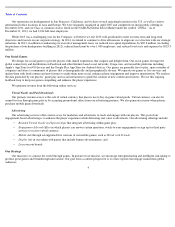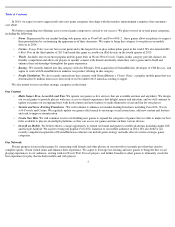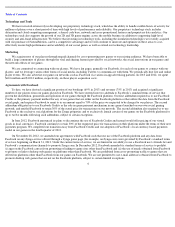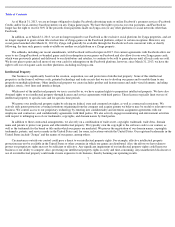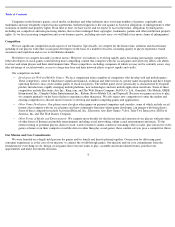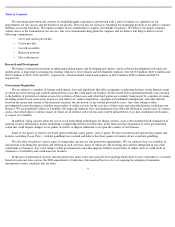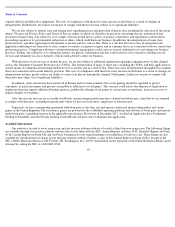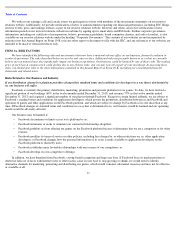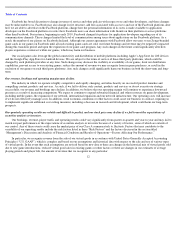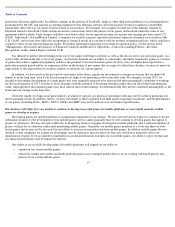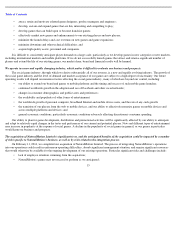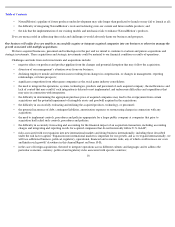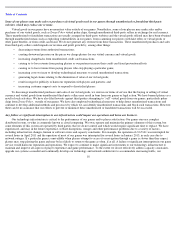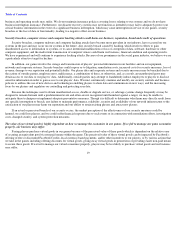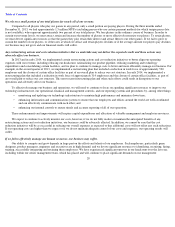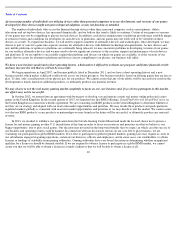Zynga 2013 Annual Report Download - page 16
Download and view the complete annual report
Please find page 16 of the 2013 Zynga annual report below. You can navigate through the pages in the report by either clicking on the pages listed below, or by using the keyword search tool below to find specific information within the annual report.
Table of Contents
Facebook has broad discretion to change its terms of service and other policies with respect to us and other developers, and those changes
may be unfavorable to us. Facebook may also change its fee structure, add fees associated with access to and use of the Facebook platform, alter
how we are able to advertise on the Facebook platform, change how the personal information of its users is made available to application
developers on the Facebook platform or restrict how Facebook users can share information with friends on their platform or across platforms
other than Facebook. For instance, beginning in early 2010, Facebook changed its policies for application developers regarding use of its
communication channels. These changes limited the level of communication among users about applications on the Facebook platform. As a
result, the number of our players on Facebook declined. Although our current agreements with Facebook allow our users to use Zynga-branded
game cards in our games on Facebook until all such existing game cards are sold, our future bookings and revenue may be negatively impacted
during this transition period and upon the expiration of our game card program. Any such changes in the future could significantly alter how
players experience or interact within our games, which may harm our business.
Our social games also leverage the global connectivity and distribution of mobile platforms including Apple’s App Store for iOS devices
and the Google Play App Store for Android devices. We are subject to the terms of service of these third party platforms, which could be
changed by such platform providers at any time. Such changes may decrease the visibility or availability of our games, limit our distribution
capabilities, prevent access to our existing games, reduce the amount of revenue we may recognize from in-game purchases, or result in the
exclusion of our games on such third party platforms. Any such changes could significantly harm our business in both the short-term and long-
term.
Our revenue, bookings and operating margins may decline.
The industry in which we operate is highly competitive and rapidly changing, and relies heavily on successful product launches and
compelling content, products and services. As such, if we fail to deliver such content, products and services or do not execute our strategy
successfully, our revenue and bookings may decline. In addition, we believe that our operating margin will continue to experience downward
pressure as a result of increasing competition. We expect to continue to expend substantial financial and other resources on game development,
including mobile games, the expansion of our network, international expansion and our network infrastructure. Our operating costs will increase
if we do not effectively manage costs. In addition, weak economic conditions or other factors could cause our business to contract, requiring us
to implement significant additional cost cutting measures, including a decrease in research and development, which could harm our long-term
prospects.
Our quarterly operating results are volatile and difficult to predict, and our stock price may decline if we fail to meet the expectations of
securities analysts or investors.
Our bookings, revenue, player traffic and operating results could vary significantly from quarter-to-quarter and year-to-
year and may fail to
match our past performance or the expectations of securities analysts or investors because of a variety of factors, some of which are outside of
our control. Any of these events could cause the market price of our Class A common stock to fluctuate. Factors that may contribute to the
variability of our operating results include the risk factors listed in these “Risk Factors” and the factors discussed in the section titled
“Management’s Discussion and Analysis of Financial Condition and Results of Operations—Factors Affecting Our Performance.”
In particular, we recognize revenue from the sale of our virtual goods in accordance with United States Generally Accepted Accounting
Principles (“U.S. GAAP”), which is complex and based on our assumptions and historical data with respect to the sale and use of various types
of virtual goods. In the event that such assumptions are revised based on new data or there are changes in the historical mix of virtual goods sold
due to new game introductions, reduced virtual good sales in existing games or other factors or there are changes in our estimates of average
playing periods and player life, the amount of revenue that we recognize in any particular
12


